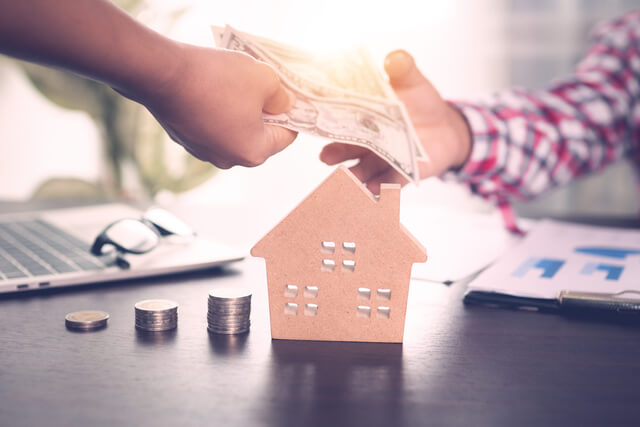What Happens to Real Estate When Stock Market Crashes

What happens to real estate when the stock market crashes? If you’re one of those investors who often ask this question, this article will benefit you. Diversification is how wise investors generate wealth, owning a mix of stocks, bonds, and estate development in their portfolios.
Diversification distributes risk among several assets with potentially opposite relationships. This implies that if one falls, the other rises. Bonds have historically risen when equities have fallen, but this is not always the case. Bond interest rates decrease when bond prices grow.
The stock market, in contrast, has a less direct tie with real estate. What determines how stock market collapses affect the housing market is what precipitated the crash in the first place.
This often gets linked with external factors such as employment and, most recently, a worldwide pandemic. Join us to demonstrate what happens to real estate when the stock market falls.
What Does a Stock Market Crash Look Like?

Investors may refer to a 10% drop in a financial index as a collapse. When the market falls 20% from its peak, it is said to be in a “bear” market. The bull and bear represent great and low times, respectively.
A bull market continues to rise. However, all investors understand that what goes up must ultimately come down. When equities fall sharply, investors sell more risky assets and shift their portfolios to “safe” stocks and other investments. This tends to maintain their worth in challenging economic times.
Real estate, it seems, should be classified as a “defensive investment.” People will always seek a place to live, after all. However, their inclination to purchase or sell a property is affected by the state of the economy. The stock market is one example, but it is hardly the only one.
What Happens to Real Estate When Stock Market Crashes?
When someone is thinking about investing their money or plans to invest it for an extended period, they generally consider real estate or equities. Some people may focus on either the home market or stock investing.
On the other hand, others like to diversify their investments by having an income stream from both sides. Both options are acceptable. They’ll assist you in keeping your money safe in the long term.
They will also provide opportunities to get a second (or primary) source of income. They do, however, have their share of dangers. However, the overall advantages and disadvantages of each option are rather diverse.
This doesn’t imply that the stock market doesn’t influence your real estate investment income. If a stock market is very volatile, property investors are much more curious about how this impacts housing and real estate markets.
Whether they’ve purchased any stocks, any investor will be affected by a drop or gain in the stock market. Most businesses, including the housing industry, are influenced by major stock indexes. As a result, a substantial shift may be both thrilling and alarming.
For example, real estate investors may be anxious about whether they should sell their properties after a steep and unexpected drop in the stock market.
Buyers may also be concerned about how they lost out on identifying and purchasing good investment homes. It’s an excellent step to brush up on how the stock market impacts your assets, whether you’re a property or real estate investor.
Real Estate Stock Market Crashes: Factors to Consider

Here are a few things to consider regarding the future of real estate if the stock market crashes:
A low-volatility stock market
Home purchasers will most likely get cheaper interest rates from lenders if the stock market is not highly volatile. This is because house purchasers will be more confident in their ability to repay the loan. However, it may not be a good option since the volatile stock market.
High-volatility stock market
However, in a highly volatile stock market, purchasers who want to buy a house will be unsure or confident about their capacity to make mortgage payments. As a consequence, the home market will necessarily suffer.
Most business executives want to discover whether or not purchasers seeking any financing are trustworthy. This is why they have increased the interest rates on their loans. They take that risk into account since most purchasers are having financial difficulties.
Initial Deposits
Before taking possession of any real estate, most purchasers must make a down payment. Currently, the standard request is 20% of the dwelling or land acquisition price.
On the other hand, property purchasers may experience difficulties financing down payments if the economy and stock market sink. If somebody wants to acquire a mortgage loan, the down payments will have to increase.
A mortgage loan may be a possibility, but it is not a brilliant idea to take one out if interest rates are high. Some investors may get out by accumulating equity via their assets and using that strategy to get cash. The stock market, however, may have an impact on this circumstance.
Property values will fall as the economy and stock market deteriorate. This implies that obtaining sufficient equity to acquire investment homes will be challenging and demanding for the ordinary buyer.
A solid financial base and a thriving stock market, on the other hand, will have the opposite impact. With steady and generally cheap loan rates, conventional down payments are likely to be made.
This will enable prospective property buyers and investors to make plans and even save enough money to make a complete payment.
Consumer Perceptions
Consumers are less likely to become house purchasers or investors if they aren’t secure in their present or future financial status. Real estate investors are more inclined to purchase residences when stock indexes are doing well.
For the most part, real estate investors only seek to buy investment properties when the primary stock indexes are rising. This indicates that their consumer trust is growing, and they are confident in their ability to construct a secure financial future.
On the other hand, the possibility of stock indexes collapsing and real estate investors losing confidence is always present. Purchasing property will be risky in this circumstance.
Regardless of housing pricing, purchasing one might get you stuck with an obligation rather than an income-generating asset. Even if you could discover some low-cost mobile homes for sale, a falling stock market may discourage you from making such a purchase.
Before making any payments, it would be preferable to wait and see how things proceed.
Furthermore, fluctuations in stock market indexes have an impact on property sellers. Because of the decreased demand in the property market, sellers will get forced to drop their house prices. This will make it easy to purchase a home.
However, investing in a stock market that is very volatile is still dangerous. There are also more excellent mortgage interest rates and larger down payments. Relying on equity will also limit your options. As a result, purchasing a rental property might be difficult. All of this might impact the real estate market’s overall performance.
Consumer Attitudes
We’ve previously discussed how the stock market’s success influences consumer behavior. Consumer behavior, in general, has a role in determining whether real estate investments will be affected by stock market fluctuations.
Consumers are more inclined to assume the risk of real estate investments if the stock market performs well. Consumer spending will fall when the stock market falls. Real estate investors are unlikely to sell their houses since individuals will not spend money as often or quickly.
This will become a vicious loop. Because investors would see their portfolio decline, they would be more careful and conserve their cash in future disasters.
Frequently Asked Questions
What happens to real estate when the stock market crashes?
The simple fact is that when losses increase and credit requirements tighten, cheap mortgage financing becomes unavailable. In addition, as previously said, demand falls, supply rises, speculators exit the market, and prices fall.
Is it preferable to purchase a home during a market downturn?
Buying a property during a recession will, on average, earn you a better price. The number of foreclosures and owners forced to sell to remain afloat is rising. This usually results in a more significant property on the market and reduced housing prices.
Is real estate investment better than stocks?
In real terms, equities outperformed real estate by 8.5 percent to 6.1 percent in the United States.
What happens to my home loan if the economy crashes?
When a country enters a recession, it indicates a significant reduction in economic activity. Many people may face financial difficulties, including job losses or decreased income. However, payments will continue to be due, including your mortgage payment, and you will be obligated to pay them.
Conclusion
In conclusion, real estate and the stock market usually have some peculiarities. And in the event of a market crash, the real estate sector is generally affected. This is quite valid, as elaborated above.






